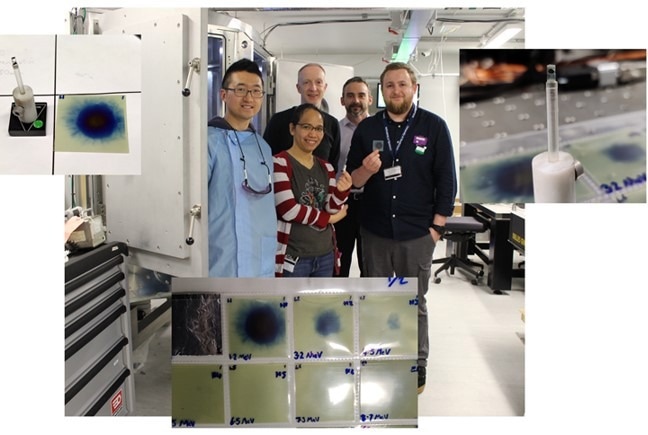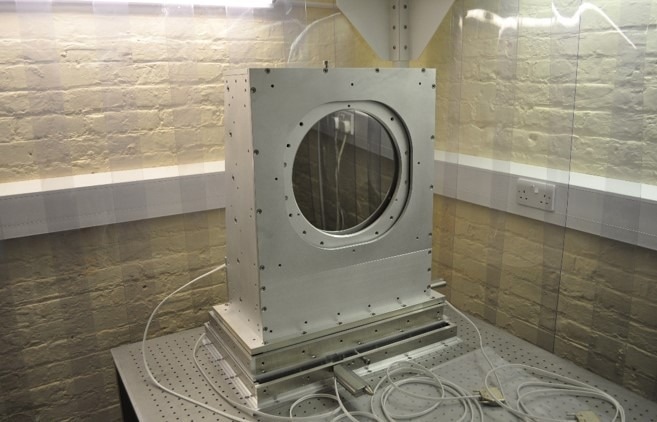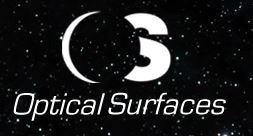Optical Surfaces Ltd. has received a follow-on order from the Scottish Centre for the Application of Plasma-based Accelerators (SCAPA) at the University of Strathclyde (UK), for two ultra-high performance off-axis parabolic mirrors.

SCAPA and SILIS research staff marking their first laser-driven proton beam shot. Image Credit: SCAPA and the SILIS group
These new mirrors will be deployed in a state-of-the-art laser-driven proton and ion beam accelerator on campus. The newly procured off-axis parabolic mirrors, supplied by Optical Surfaces, are short focal length (210 mm) optics dedicated to enabling investigation of ultra-high contrast, ultra-intense laser-plasma interactions. Each parabolic mirror will be installed in a custom vacuum motorised mount, previously designed and manufactured by Optical Surfaces, which enables the focused laser intensity to exceed 1021 W/cm2. When focused onto a micron-thick solid target, such as an aluminium foil, a short intense pulse of energetic protons and ions is generated.
The SCAPA facility operates a suite of ultra high-power laser systems, including 350 TW and 40 TW lasers that operate at 5 Hz. These lasers are housed in three radiation shielded bunkers kitted out to support laser-plasma physics and laser propagation studies, by both academic and industrial users, with an emphasis on radiation sources, radiation damage studies, healthcare, and laser propagation applications. Operational beamlines at SCAPA include an ion accelerator plus laser-driven electron, gamma-ray, and alpha particle secondary sources.
Under the auspices of a UK-wide project called LhARA, researchers are investigating application of these laser-produced proton and ion beams towards next-generation proton radiotherapy machines for treating cancer tumours. In addition, SCAPA scientists are also investigating recreating the natural radiation conditions found in space enabling development of more robust electronics for satellites and spacecraft.

A vacuum compatible motorised mirror mount. Image Credit: Optical Surfaces Ltd.
Dr Ross Gray, a Senior Research Fellow who leads the work program for the LhARA proton source said “In order to generate the optimised beams we need to study effects of high-energy protons on cancer cells and in materials used in space-based electronics. For this we require a high quality and very small focal spot which then enables us to reach extremely high laser intensities. The high performance off-axis parabola provided by Optical Surfaces will ensure high reflectivity and excellent wavefront quality, focusing the high energy laser pulse from around 11 cm in diameter down to almost 1.5 microns, in turn producing some of the highest intensity laser pulses available today”.
Professor Dino Jaroszynski, Director of SCAPA, said “Because of the excellent results we achieved using mirrors supplied in 2018, we elected to again choose Optical Surfaces to produce the new fast focusing mirrors for our optical setup. The high quality of these off-axis parabolic mirrors will ensure excellent function, good stability, longevity, and reproducibility in experiments. Users will benefit from both long-term, systematic experiments, and short-term exploratory experiments. This will enable them to investigate promising lines of research using our world-class infrastructure and facilities and yield high impact results. SCAPA is used by a broad range of researchers developing and applying radiation sources based on high power lasers.”
Optical Surfaces Ltd has been producing high precision optical components and systems for nearly 60 years. The company’s ISO 9001-2015 approved manufacturing workshops and test facilities are deep underground in a series of tunnels excavated in solid chalk where temperature remains constant, and vibration is practically non-existent. With such stable conditions testing, particularly with long path lengths, becomes quantifiable and reliable. Today, Optical Surfaces Ltd is accepted as one of the world’s leading manufacturers of parabolic mirrors for high energy laser research. For further information on off-axis parabolic mirrors for high energy laser research please visit http://www.optisurf.com/index.php/products/off-axis-paraboloids/ or contact Optical Surfaces Ltd. on +44-208-668-6126 / [email protected].
For further information on SCAPA and the Strathclyde Intense Laser Interaction Studies (SILIS) Group please visit http://www.scapa.ac.uk/ and http://silis.phys.strath.ac.uk.
